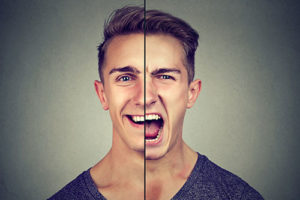 Many people who have addictions also suffer from some other type of mental health disorder. One of the more common mental health conditions that often present with addiction is bipolar disorder, characterized by intense mood swings. Studies have shown that as many as 60% of bipolar disorder also have a history of addiction.
Many people who have addictions also suffer from some other type of mental health disorder. One of the more common mental health conditions that often present with addiction is bipolar disorder, characterized by intense mood swings. Studies have shown that as many as 60% of bipolar disorder also have a history of addiction.
Northpoint Recovery recognizes the connection between bipolar disorder and rehab and offers co-occurring disorder treatment to help you navigate the struggles of bipolar disorder and addiction. Reach out to learn how to get you on the path to recovery by calling 888.296.8976.
Bipolar Disorder Explained
People with bipolar disorder are much more likely to abuse drugs or alcohol. As a result, the symptoms of their mental health conditions are usually much worse than someone with bipolar disorder who does not abuse substances. It is also possible for people who do not have a history of mental health problems to develop bipolar disorder due to their addictions.
The intense mood swings associated with bipolar disorder are referred to as episodes. They can happen several times throughout the week or only a few times a year. It’s also typical for bipolar disorder to lead to energy changes and difficulty concentrating.
Experts understand that bipolar disorder is caused by the imbalance of chemicals in the brain, and they believe that genetics can also play a distinct role in it. People with bipolar disorder will generally present with one of four different episodes:
- Manic episodes – Manic episodes are characterized by expressions of intense hostility or even cheerfulness. They usually last around a week and often require that the individual be hospitalized for treatment.
- Major depressive episodes – Major depressive episodes last at least two weeks. They are characterized by severe depression that results in the individual being uninterested in any activity they usually enjoy.
- Hypomanic episodes – Hypomanic episodes are similar to manic episodes, but their duration is much shorter, lasting up to four days, and are not quite as severe.
- Mixed episodes – Mixed episodes are when any of the above presents in a short period. They can include traits from any of the above episodes as well.
While there are different types of bipolar disorders, the mood shifts in both lead to very high “high” periods and very low “low” periods.
How Are Bipolar Disorder and Addiction Connected?
When someone has bipolar disorder, its effects on the mind and body can be quite profound. People often think of mental illnesses as having a distinct effect on the mind, but they can also lead to physical ailments and illnesses. Whether a person is experiencing a manic or a depressive episode, many different changes can occur. Mentally, this can result in:
- Experiencing long periods of hopelessness or helplessness
- Very low self-esteem
- Significant decrease in energy
- Problems with concentration
- Problems with making easy decisions
- Significant changes in eating and sleeping habits
- Agitation
People with bipolar disorder are also at a very high risk of suicidal thoughts or behaviors. They often have anxiety disorders that occur simultaneously and are at very high risk for addiction. The tendency is to self-medicate with drugs or alcohol to alleviate some mental difficulties. They are often unable to deal with the pain that their episodes produce and rely on substances to relieve the pain at least temporarily.
It is also possible that brain chemistry might explain why bipolar disorder and addiction are often linked. People with bipolar disorder usually have abnormal serotonin and dopamine levels in their brains. To cope with these abnormal levels, these individuals might turn to drugs and alcohol. However, substances don’t help; they only make symptoms much worse. Usually, the addiction has already formed by the time this is discovered.
Dual Diagnosis Treatment for Bipolar Disorder and Addiction
Even though addictions can cause bipolar disorder diagnoses, more often than not, people who have this condition will turn to substances as a way to cope. Therefore, it’s important to provide treatment for both conditions simultaneously through a dual diagnosis treatment program.
At Northpoint Recovery, patients work closely with a therapist to get a proper diagnosis and then treat the underlying cause of the addiction, utilizing various therapies as part of the co-occurring disorder treatment plan, including:
- Family Therapy
- Cognitive-behavioral therapy
- Yoga therapy
- Art therapy
- Music therapy
- Group and individual therapy
Above all, patients’ treatment is based on their symptoms, diagnoses, and individual needs.
Need a Bipolar Disorder Treatment Program in Boise? Northpoint Recovery is Here to Help
Do you feel alone or too embarrassed to share your bipolar disorder diagnosis with anyone close to you? Are you struggling with addiction to mask your symptoms of bipolar disorder? Regardless of your situation, know that help is available for you, and you don’t have to continue to suffer in silence.
At Northpoint Recovery, our goal is to provide patients with the right kind of help that they need for their co-occurring disorders. If you would like to learn more about how Northpoint Recovery can provide you with dual diagnosis treatment for bipolar disorder and addiction, reach out to a team member by calling 888.296.8976.
